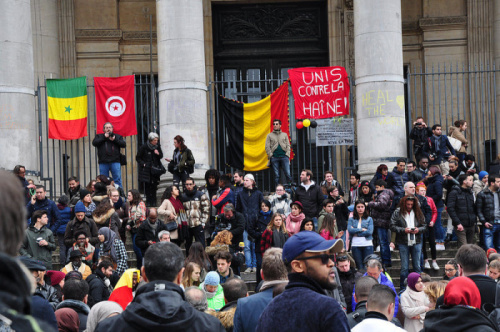Through suicidal martyrdom, the predominantly young and male fundamentalist, the shahid, attains a touch of divine (or demonic) nature. A young male body is blown to pieces, engulfing innocent bystanders along with itself in death, as if not so much by the force of an explosive belt as by the no less explosive force of inner convictions. It is a terrifying spectacle as well as a mystery.
As an individual, each of us is vulnerable. But as societies, we are stronger than we usually think. That precisely is the logic behind the terrorist tactics. Clearly, in light of these attacks, a shocked resident of Brussels like myself or any other consumer of the mainstream news-coverage might find it difficult to remember that terror is a sign of weakness and not of strength; that its warfare is asymmetric.
The terrorists’ wilful accomplices, radicals of all kinds, populists and #hellhole prophets gleefully lick their lips in preparation for their own attacks. But whatever we hear from them in the coming days will not be new. They too aim to polarize or, even, atomize. They too wish to make entire societies act as threatened individuals, succumbing to the deadly charm of their extremist thinking.
It is high time to act as a society and uphold the very values that originate in Europe: human rights, equality and the rule of law, among others. In the name of these, we must fight for the inclusion of the disadvantaged in our midst and on our borders, and against bigotry, racism and intolerance. This fight must be at least as strong as our fight against terrorism.
Europe’s ethical, symbolic, and concrete survival depends not so much on becoming a fortress but on accepting and integrating the refugees.
“To put Brussels under lockdown might be comprehensible but, in the long run, it will only maim its very life and contribute nothing to its security,” tweeted Eric Corijn, Brussels-based professor and urbanist. In fact, Europe as a whole must also put an end to its lockdown attitude. A Reuters’ photograph has captured a refugee boy on the Greek-Macedonian border with a handwritten sign in his hands saying: “Sorry for Brussels.” The attacks were a dramatic demonstration that this boy and the citizens of Europe are locked in the very same bloody struggle. Hence, Europe’s ethical, symbolic, and concrete survival depends not so much on becoming a fortress but on accepting and integrating the refugees. To show solidarity with them and their plight would be the most suitable way to pay tribute to the victims of terrorism.
Regarding the attacks themselves, it would be an oversimplification to treat them as an act of vengeance for Salah Abdeslam’s arrest, as the Belgian intelligence services are reported to suggest.
The fact that their murderous act is also suicidal helps terrorists avoid the system of justice — at least in this world. And even though suicide is ultimately a sign of weakness and of cowardice, it is also the efficacy of terrorism, since the impossibility of punishing acts of extreme violence leaves society symbolically traumatized. That is the reason why the arrest is a historic moment and opportunity. It is one of the first times — if not the first time ever — that an Islamist terrorist, a co-organizer of suicide attacks, was taken into custody alive.
After Abdeslam’s capture, I was hopeful that the machinery of justice would be able to start its slow rolling. The suspect would appear before judges, the families of the victims, and the general public; he would appear as a human with his story, with all his human ambiguities, secrets and weaknesses. He would have to explain in detail his involvement and, maybe, also why he is still alive after what happened in Paris on November 13. I imagined that, with time, his case would become healthily boring, that civilization’s clumsy, dry-as-dust normality would prevail.
That is why, in my opinion, the violent events in Brussels should not be considered a revenge but primarily an attack on the rule of law. And that is also why I still hope that it will be upheld and that Abdeslam will face a fair, just and slow process in court. And since it seems that the terrorists with whom he might have been involved desperately want to make him a martyr at all cost, I do hope that the courts will remain as emotionally unaffected and as bureaucratic as they possibly can. I hope that terrorists will be treated for what they are — criminals.
The article was first published on Katoikos.eu
![Political Critique [DISCONTINUED]](http://politicalcritique.org/wp-content/uploads/2015/09/Political-Critique-LOGO.png)
![Political Critique [DISCONTINUED]](http://politicalcritique.org/wp-content/uploads/2015/09/Political-Critique-LOGO-2.png)
